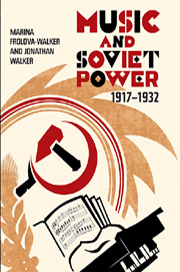Book contents
- Frontmatter
- Contents
- Preface
- Acknowledgements
- Note on transliteration
- Chronology of Political and Musical Events
- October 1917–18: Out of Chaos
- 1919: Depression and Fever
- 1920: Bureaucracy on the Rise
- 1921: Should I stay or should I go?
- 1922: Just Like the Old Days?
- 1923: The Birth of ASM and RAPM
- 1924: ASM in the Ascendant
- 1925: Equilibrium
- 1926: Guests from the West
- 1927: Celebrations
- 1928: At the Crossroads
- 1929: Velikiy perelom – The Great Turning Point
- 1930: RAPM's Glorious Year?
- 1931: RAPM's Fortunes Turning
- 1932: The Rules Change
- Key to Acronyms and Institutional Bodies
- Glossary of Names
- Bibliography
- Index
1929: Velikiy perelom – The Great Turning Point
Published online by Cambridge University Press: 05 April 2013
- Frontmatter
- Contents
- Preface
- Acknowledgements
- Note on transliteration
- Chronology of Political and Musical Events
- October 1917–18: Out of Chaos
- 1919: Depression and Fever
- 1920: Bureaucracy on the Rise
- 1921: Should I stay or should I go?
- 1922: Just Like the Old Days?
- 1923: The Birth of ASM and RAPM
- 1924: ASM in the Ascendant
- 1925: Equilibrium
- 1926: Guests from the West
- 1927: Celebrations
- 1928: At the Crossroads
- 1929: Velikiy perelom – The Great Turning Point
- 1930: RAPM's Glorious Year?
- 1931: RAPM's Fortunes Turning
- 1932: The Rules Change
- Key to Acronyms and Institutional Bodies
- Glossary of Names
- Bibliography
- Index
Summary
In Soviet historiography, 1929 is known as the year of the Great Turning Point, but Soviet music histories rarely give the year any special mention because there were no significant Party resolutions that had a direct bearing on musical life. Nevertheless, musicians at the time certainly felt the change, as the following passage in a letter from Boris Asafyev to Alban Berg attests:
Here, victory belongs to those taking music in a different direction – towards the music of the past and epigonism – and so neither I myself, nor the many other friends of Wozzeck will hear it again for a long time!
Asafyev's assessment proved correct, and the change in policy did indeed take place (three years hence, Asafyev himself became an unlikely beneficiary). Even at this late stage, RAPM was still unable to take the lead. Of crucial importance was the First All-Russian Conference of Music Workers, held in mid-June. Bringing together over 800 delegates and guests, this musical forum was unprecedented in size, a demonstration of the Soviet leadership's new seriousness in seeking a unified policy on music.
The change of policy did not affect repertoire radically (aside from Wozzeck, as we shall see), and new music was still prominent on both the stage and in the concert hall. There was plenty of Stravinsky: Klemperer played Petrushka and Pulcinella; ASM made forays into the sphere of music theatre by staging Mavra (at Tsetetis, the Theatre Institute); Oedipus Rex and the Piano Concerto were also given their Soviet premieres.
- Type
- Chapter
- Information
- Music and Soviet Power, 1917–1932 , pp. 217 - 260Publisher: Boydell & BrewerPrint publication year: 2012



